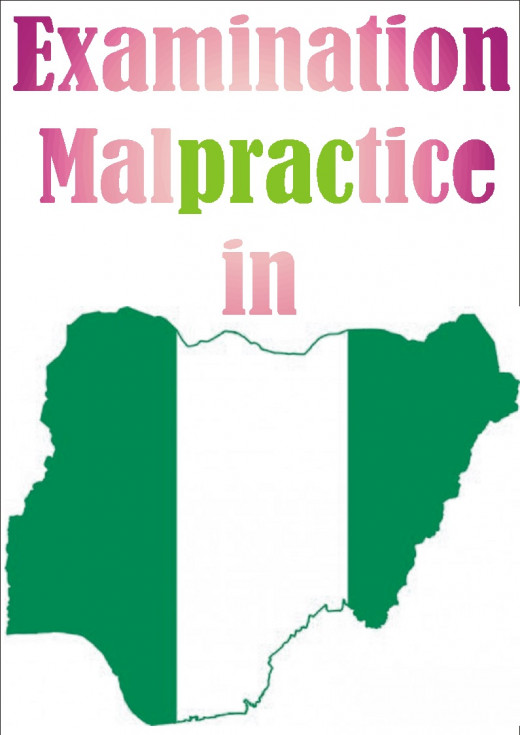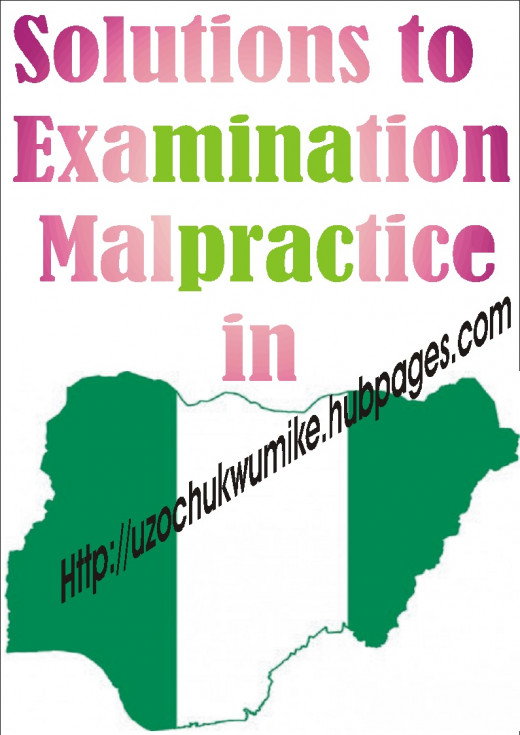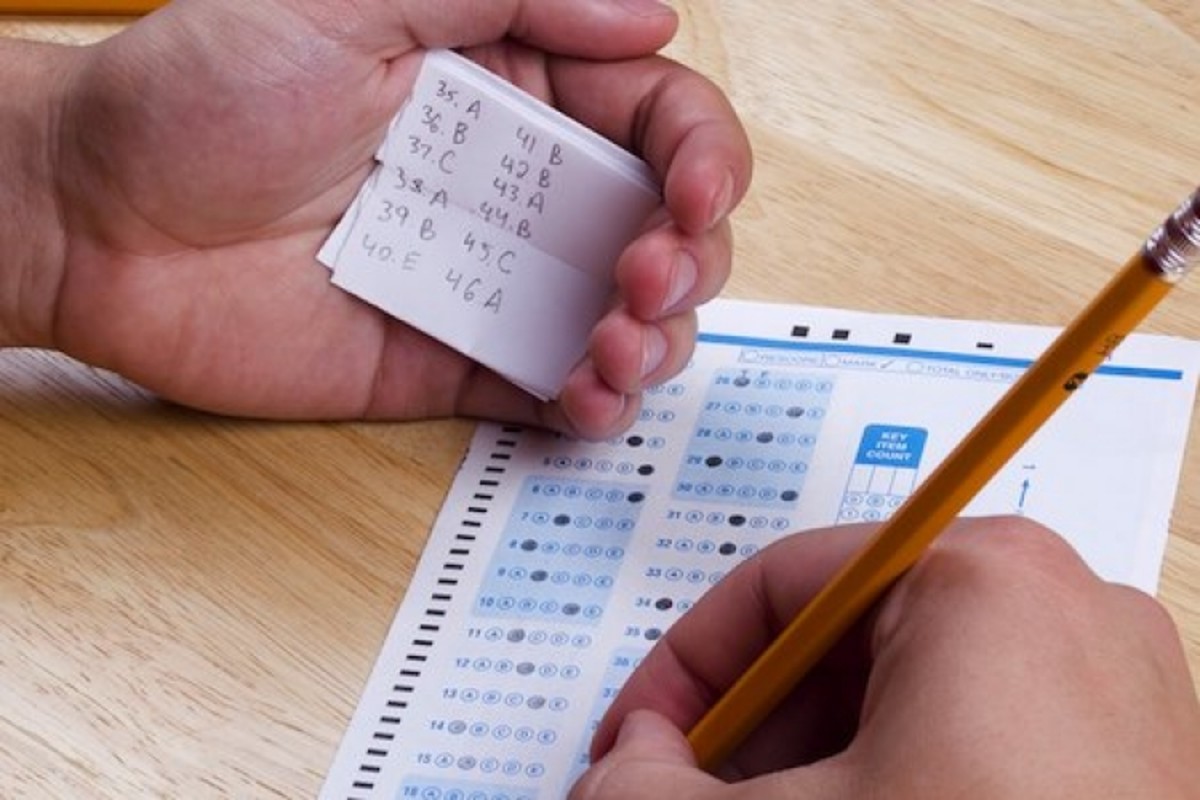Examination Malpractice in Nigeria
Examination Malpractice

Examination malpractice is turning into a culture in Nigeria but we cannot fold our arms and allow it to keep going on. A lot of things have been going on in the education sector of the Federal Republic of Nigeria, which do not say well about the country. Those things are not encouraging in anyway. Example of such is massive examination malpractice by the students in the African most populated country, Nigeria. The dignity attached to the education sector of the country is speedily depreciating because of massive involvement of students in the country in cheating during the time of test. Of the truth, this is like a culture in the school system of the country mainly in secondary schools all over the country. The question is “where shall constant involvement in examination malpractice by the students of Nigeria lead the country to”? Does the act say good of the country or not?
Today, we see where the Law Makers of the country fight due to misunderstanding in the House. Some of them got to that stage because they engaged in malpractices before they got their academic certificates. As a result of this, they do not pay much attention to moral practice and that is why you see them fight in Senate and House of Representative meetings to the extent of hitting opponents in the fight with mace. What a mess?
Examination malpractice involves two principal words “examination” and “malpractice”. What is examination? Examination is defined as a formal test of knowledge or proficiency in a subject or skill. The view of many other authors is not far from that given by Oxford Advanced Learners Dictionary. Balogun saw examination as the process through which students are evaluated or tested to find out the quality of knowledge they have acquired with a specific period (Balogun 1999). Malpractice is defined as improper or illegal behaviour. Examination malpractice tends to relegate certificates issued at all levels (Oredein 2012) in Nigeria.
The fight for the menace in Nigeria has not yielded any fruit because of many reasons. There is high insincerity among those who pretend to be making efforts to stop this dirty game being played in the country. Of the truth, if the government and heads of various schools want to stop malpractice in schools, they should first start making adjustment within themselves. The reason is because they make the law and at the same time break the law as well. Who is now fooling who? The moment those at the top start having bitter feeling about it and start true fight, there will be positive change and transformation.

The reasons why that corrupt practice is rampant in Nigeria are:
- Weak services by the teachers;
- Unserious attitudes of the students;
- Non-Patriotism;
- Government failure; and
- Insincerity among the Academic board.
Weak services by the Teachers
Not only that the teachers that teach in some schools in the Federal Republic of Nigeria are unqualified but there are many who are weak in carrying out the academic duties being assigned to them. They paint the image of the education sector of the country black. Teachers in some secondary schools of the country are finding it very difficult to teach the students in the way they can comprehend. Teaching is a call and some who force themselves into it till today are messing up as they cannot impact knowledge into the students.
In the institutions of higher learning in the country, we see lots of the lecturers pay more attention to their personal business rather than concentrating on their lecturing services. Due to this reason, they do not have enough time to make proper research that will enable them make positive change in the students academically. Some of them find it difficult to finish their academic syllabus in each semester because of their engagement in other areas as they want to make more money, thereby neglecting their primary duty. As a result of this problem, Nigerian students indulge in examination malpractice to upgrade their scores during examinations.
Unserious attitudes of the Students
Some students are not serious at all. Some prefer to stay at home or engage in small works that will earn them money rather than being in school to learn. A case study is what happens in one secondary school in Etsako West Local Government Area of Edo State (name withdrawn). As someone that carried out one year Nigeria Youth Service Corp in the school, I was able to observe this. Some of the students that are trained in the schools do not see education as anything that is encouraging. They prefer to disturb the classes during teaching because to them education is nothing. Tell me how those that belong to this category can make it in their examinations when they do not want to learn. In fact, the only option left for them is examination malpractice if they really want to make it during examinations.
When students do not pay attention to what they are being taught in the schools by their instructors, they find malpractice as a hideout for them to make it when called for examinations. Senior Secondary School Certificate Examinations being carried out in secondary schools in the Federal Republic of Nigeria has been weakened by this corrupt practice because Nigerian students do not want to be serious with their studies.
Non-Patriotism
What does examination malpractice in Nigeria has to do with patriotism? This is a common question that many will ask once they come in contact with this segment. Can people be careless of the effects of examination malpractice due to non patriotic behaviour? Let us start by define what patriotism is. What is patriotism? According to Oxford Advanced Learners dictionary, patriotism is defined as the quality of being patriotic; vigorous support for ones country. In the other words “non-patriotism” is the opposite of patriotism.
It is because of none patriotic attitude of many heads of schools that make them to encourage malpractice in examinations in one way or the other. They do everything within their powers whether that act is “dirty” or not to make their students excel in promotional exams and attract “dirty credit” to themselves. Today, most principals and proprietors of secondary schools do not see such act as examination malpractice again. They have "baptized" it as offering help.
If they are patriotic, they have to understand that such act dents the image of the country and hence quit from such behaviour.But they are not as they are blinded from the truth.
On the other hand, students who indulge in examination malpractice because they are too lazy to study their books to make it themselves are not vigorously in support of their country. If they truly love our country, they should say no to such practice so that the image of the country will be preserved. That is the secret and fact many of them do not know and understand. Today, some Nigerian students who travelled to United States of America and other parts of Europe are demoted because of the level of the unhealthy practice in the country. The board of directors within themselves concluded that since such act is becoming culture in the country, there is need for them to repeat classes they have passed through before they came to their countries.
Also, one who loves his country will make effort and study hard to promote his country. When you work hard and bring credit to your country, it shows that you are patriotic in action and behaviour. Students who gained knowledge as a result of their hard work have represented their countries in so many international competitions. So, if Nigerian students will say no to examination malpractice and show patriotic behaviour, it will be a sound credit to the nation.
Government Failure
What is expected among students where the government of the country pay lip service to her education sector? A weak yam will always yield a weak produce, and unhealthy pig will always give birth to unhealthy piglet. That is the unarguable truth. The money appropriated to the education sector in the 2013 budget was ₦426.53 billion which amounts to only 8.67% of the total budget (₦4.92 trillion) (Uzochukwu Mike, 2013). The government who cares for her education sector is not suppose to have such small percentage of budget for the sector.
Because government of Federal Republic of Nigeria does not give standard support to the country’s education sector, the students lack in what they suppose to know before engaging in examinations. When they are not taught what they are supposed to know because they are lacking in teachers, during general examinations, they are being compelled to take part in malpractices. But had it been they were taught all they suppose to know before such examinations, the rate of malpractice will be reduced to some extent. The government does not even provide enough money for employing teachers in secondary schools.
A case study is what the author of this topic witnessed in Edo State. In most government schools located in Etsako West of the state, they have limited number of permanent teachers. The reason is because the government of the state does not employ enough. The secondary schools only use Youth Corp Members who come every year as their teachers and once any of them leaves, that subject he or she is teaching will be vacant, that is to say that nobody handles the subject again until another member is being sent to take over the topic. That means that if no Youth Corp member is found fit for that subject, that subject will not be taught to the students for months or even a year.
What about the government inability to provide leaning facilities like equipments for practical and good learning environment for the students? Though the government of the country is rebuilding some old secondary schools in the country, yet more is expected from them. The learning equipment for practical is outdated and need to be re-branded. Some do not even have any at all and then ask how they can be able to make it in subjects that involve practical.
Insincerity among the Academic board
What is insincerity? Insincerity is a situation whereby people are not showing genuine feelings about specific condition or situations. The academic board of Nigeria pretends they are serious in the fight to examination malpractice in the country but they are not in any way. They are the people that preach against examination malpractice yet they promote the practice in one way or the other.
What is the author trying to say? Can he give more clarifications on his point? Some members of the academic board who are clamouring for eradication of such attitude are serving as principals in most secondary schools. During the examinations, they are the one to copy and photocopy answers to questions and smuggle them into the halls for the students to make it at the end of the process. They go to seminars and give “sermon” concerning the negative effects of the dirty act while they are the people that encourage that the most.
During the marking of the scripts after promotional examinations like West Africa Examination Council (WAEC) and National Examination Council (NECO), they see the product of their hand-works and nothing is done. Almost 60% of all the students that take part in a particular subject copy the same thing and they do nothing about it. Is that not a clear insincerity among them? If they truly want to fight and end that challenge, they should first take bold step by trying to caution themselves because they are the driving force behind such dirty game.

Possible Solutions to Examination Malpractice in Nigeria
The stop to that which is painting the image of our academic sector black is a collective effort. If the menace should stop, we all need to work together. See it as something that is dirty and should be seriously stopped. See it as an act that is really hurting the country and fight it to the level you can.
The first is the insincerity among many school managements all over the country. It is a pity that some managers of so called religious schools also indulge in such. Those that head schools should not allow the students to cheat or even help by photocopying and supplying answers to them during academic tests.
Government of Nigeria both at state and federal level should have the education sector as one of their principal concern. This will make them make effort and supply institutions where formal education is carried out with the basic academic materials they need. This will help the students to learn all they need and hence perform well when called for examinations without malpractice of any form.
It is a pity that the reading and study habit of students in Nigeria is dropping. Students should gear up in their studies to make good results for themselves without having any attachment to external helpers. There should be inculcation of good moral practice among the students in the country. The moral will teach them the need to be self dependence and study hard. Mass and social media should be use to project this.
Laws have been made on the penalty for examination malpractice. But these laws lack enforcement. Enforcement of these laws on defaulters will put fear in the students and hence make them to deprive from such. In the 1999 constitution amendment, the penalty for any student caught in malpractice is fine from N50, 000.00 to N100, 000.00 (fifty to hundred thousand naira only) and imprisonment for a term of 3-4 years with or without option to fine (Act 33) and yet this amendment is not enforced.
Conclusion
Nigeria as a country is facing many challenges which among them is malpractice of students in order to make it in the time of academic test. This practice in one way or the other has been hurting the country. In summary, discussed in this topic is strictly on the reasons why examination malpractice in Nigeria is rampant and possible solutions.
References
- Balogun, J. O (1999), “Examination Malpractice and the Nigerian Society. The Jos Journal of Education, 4 (1), 110-116.
- Oredein, A. O (2011), “Checking Examination Malpractice in Nigeria in Nigerian Schools”, retrieved July 11, 2015, Institute of Education, Olabisi Onabanjo University, Ago-Iwoye, Nigeria.
- Uzochukwu O. M (2013), “Challenges in Nigeria and Solutions on how to resolve them”, retrieved July 11, 2015, Hubpages Publication, United States.
This content is accurate and true to the best of the author’s knowledge and is not meant to substitute for formal and individualized advice from a qualified professional.
© 2015 Uzochukwu Mike








